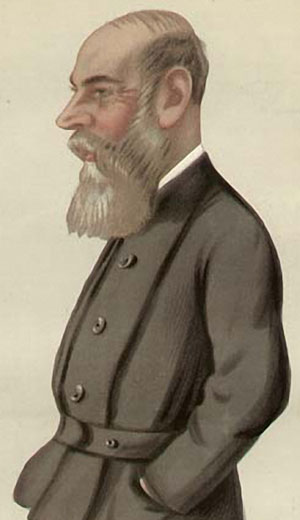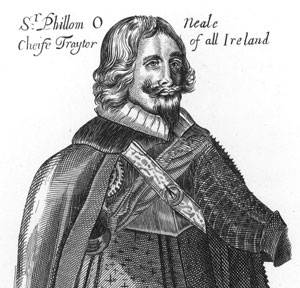BY JOHN GIBNEY
SEPTEMBER
19/1880

The nationalist leader and MP Charles Stewart Parnell gave a speech in Ennis, Co. Clare, that ultimately led to the addition of a new word to the English language. Parnell asked his listeners: ‘What are you to do to a tenant who bids for a farm from which another tenant has been evicted?’ As reported by the Freeman’s Journal, ‘several voices’ helpfully replied, ‘Shoot him’, but Parnell suggested instead ‘a more Christian and charitable way … by isolating him from the rest of the country as if he were a leper of old—you must show him your detestation of the crime he has committed’. This came at the height of the Land War and, as Parnell surely knew, here was a new way of putting pressure on landlords that was less obviously illegal than what some of his Ennis audience had in mind. Parnell’s suggestion was taken up by Fr John O’Malley, the parish priest of Kilmolara, Co. Mayo, and president of the local branch of the Land League, who at this time was supporting labourers on the estate of Lord Erne near Lough Mask who had asked for a rent reduction following a poor harvest. This was refused via Erne’s local agent, Charles Cunningham Boycott. After Boycott tried to evict eleven tenants who had refused to pay the full rent, O’Malley spearheaded a campaign that saw Boycott’s staff and labourers abandon him and local merchants refuse to deal with him. Boycott’s case became a cause célèbre at the time, but the transformation of his surname into a verb seems to have been due to O’Malley, who suggested it to the American journalist James Redpath as shorthand to describe what was happening in Mayo. ‘Boycott’ as used in this way first appeared in print in Chicago on 12 October 1880 and has had a long and often distinguished career ever since.
2/1945
Japanese representatives sign the official ‘Instrument of surrender’ on board the battleship USS Missouri in Tokyo Bay, thus confirming the formal end of the Second World War.
5/1847
The Confederate guerilla and legendary bank- and train-robber Jesse James is born in the US state of Missouri.
6/1620
The Mayflower departs on what will be its first successful voyage to North America. It arrived at Cape Cod on 21 November, bringing the so-called ‘Pilgrim Fathers’, 41 of whom had signed a compact committing themselves to establishing a new colony in what was known as New England.
13/1803
Death of John Barry in Philadelphia. Born in Wexford in 1745, he had emigrated there and embarked on a career as a merchant and naval mariner that led to his becoming the first commander of the US Navy after its establishment in 1794.
17/1939
The British aircraft-carrier HMS Courageous is torpedoed by the German submarine U-29 200 miles off the coast of Cork, sinking with the loss of 518 of her crew.
23/1966
Death of Leo Burdock, IRA veteran and scion of the fish-and-chip shop dynasty whose most famous and long-lived premises is still in business on Dublin’s Werburgh Street.
25/1917
The 1916 veteran and republican leader Thomas Ashe dies in Dublin’s Mater Hospital after being force-fed by the British authorities while on hunger strike in Mountjoy Prison.
26/1960
The first televised debate between US presidential candidates is watched by an audience of 70 million as Democratic Senator John F. Kennedy faced off against Republican Vice-President Richard Nixon in Chicago. Kennedy was widely assumed to have made the better impression on viewers than a tired Nixon, who was recovering from a knee injury that he had aggravated on his way into the studio.
OCTOBER
22/1641

Sir Phelim O’Neill, MP for Dungannon, seizes Charlemont Fort in Armagh using the excuse that he was coming for dinner. Similar attacks took place across Armagh and Tyrone over the next few days, as members of the Catholic élite who had survived the dispossesion of the Ulster Plantation embarked on what was supposed to be a limited uprising to give themselves a bargaining position in the face of increasingly anti-Catholic noises emanating from across the Irish Sea. This soon gave way to a popular revolt carried out by those Irish who had been dispossessed, which had an undeniable sectarian character as Protestant settlers were targeted for attack. Lurid accounts of the sufferings of Protestants led the colonial government in Dublin to carry out ferocious attacks against suspected rebels (i.e. Catholics in general) across Leinster and Munster and unofficial retaliations by settlers took place across Ulster, as 1641 ushered in a decade of conflict that culminated in the brutal reconquest of Ireland by the English parliament under Oliver Cromwell, whose government eventually executed Phelim O’Neill in 1653. Nevertheless, much of Ireland’s subsequent history exists in the shadow of the rebellion he instigated. By shifting religious division into open conflict it polarised religious identities in Ireland, while the land confiscations that followed the British reconquest set the balance of political and socio-economic power in Ireland for at least the next two centuries. It would be stretching things way too far to claim Sir Phelim O’Neill as the father of modern Ireland or the like, but the consequences of his actions on 22 October 1641 were more long-lasting than most.
03/1942
First successful test of the German V2 rocket, later used to attack London in the Second World War. Despite its Nazi origins, after the war the technology and the technicians behind it were later used by the US as the basis for its own missile programmes, most famously for the Apollo space missions.
9/1940
Birth of John Lennon, future Beatle, in Liverpool.
13/1994
The ‘Combined Loyalist Military Command’, speaking for Loyalist paramilitary groups in Northern Ireland, declares a ceasefire in response to the IRA ceasefire of 31 August 1994.
16/1888
Birth of playwright and Nobel laureate Eugene O’Neill in New York. He is best known for the epic (and autobiographical) Long day’s journey into night, depicting the travails of a ‘lace-curtain’ Irish-American family.
18/1685
Revocation of the Edict of Nantes by Louis XIV of France. Originally promulgated by Henri IV in 1598, the edict extended religious toleration to French Protestants, known as Huguenots. Its revocation prompted an exodus of Huguenots from France, and many were encouraged to settle in Ireland by the Protestant authorities here to bolster the numbers of the settler communities. Many were skilled workers and formed significant (and Francophone) urban communities in cities like Dublin.
23/4004 BC
Alleged creation of the world by God, as estimated by Church of Ireland Archbishop of Armagh James Ussher in the 1650s.
27/1915
Ernest Shackleton abandons his ship Endurance, trapped in ice in the Antarctic since the previous January. Born in Kildare, Shackleton’s Imperial Trans-Antarctic Expedition was intended to explore the oceans around the southernmost continent. It failed, but the abandonment of the ship led to one of the most famous feats of navigation and exploration in history, culminating in an 800-mile voyage with a select group, including Kerryman Tom Crean, which landed on South Georgia in May 1916 and ensured the rescue of the rest of the crew of the Endurance, a journey detailed in his laconic memoir South.
31/1517
The Augustinian Martin Luther, so the story goes, nails a list of 95 theses opposing the sale of ‘indulgences’ (remission of sins) by the Catholic Church to the door of the castle church at Wittenburg, Germany. Whether he actually nailed them on is disputed, but his act is generally recognised as the symbolic beginning of the Protestant Reformation.
